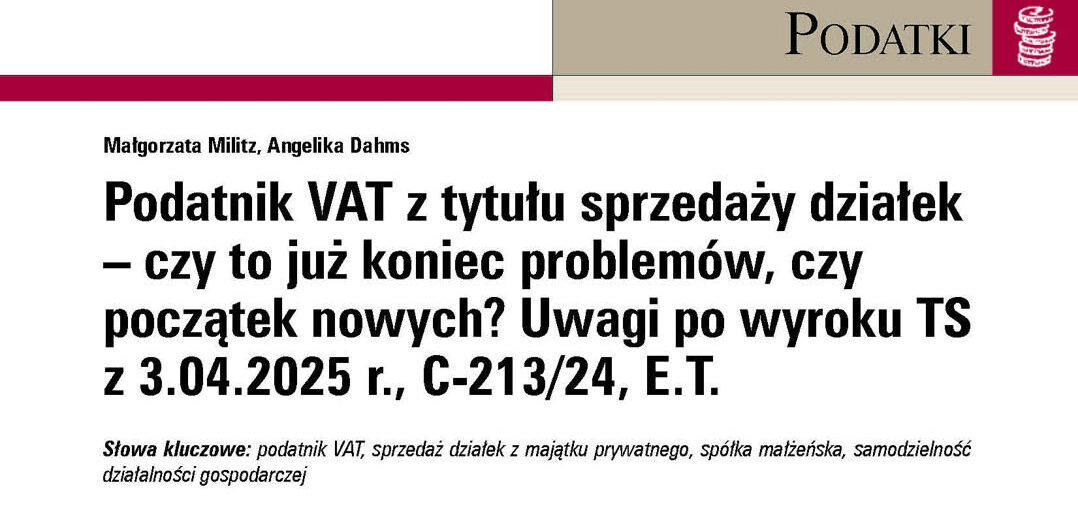On 3 July 2025, the Ministry of Finance (MoF) issued long-awaited tax explanations on the application of the so-called beneficial owner clause (BO) in the context of withholding tax (WHT).
What is the beneficial owner clause?
The BO clause is a mechanism designed to prevent the abuse of tax preferences under double taxation agreements (DTAs) and EU directives (the Parent-Subsidiary and Interest-Royalties Directives). Its application ensures that tax benefits are granted only to the entity that is the ultimate economic beneficiary, rather than the legal recipient of the payment.
The explanations remind us that the concept of ‘beneficial owner’ is not purely formal. Its essence lies in an economic meaning rather than a strictly legal approach.The requirement of beneficial ownership must be examined with respect to payments such as:
- dividends
- interest
- licence fees
However, it does not apply to payments for intangible services (e.g. consulting, advertising), which as a business profit should not be subject to WHT.
Three conditions for the definition of beneficial owner
Pursuant to the provisions of the CIT Act and the PIT Act, an entity qualifies as the beneficial owner of a receivable only if it meets all of the following three conditions:
- receives the receivable for its own benefit, including having the right to independently decide how to use it and bearing the economic risk of losing all or part of that receivable,
- is not an intermediary, representative, trustee, or other entity obliged to pass on all or part of the receivable to another entity,
- carries out genuine business activity in the country of its seat, if the receivables are obtained in connection with its business activity, and when assessing whether the entity conducts genuine business activity, account is taken of the nature and scale of the activity conducted by the entity in relation to the receivable obtained.
As emphasised by the MoF, each of these conditions must be analysed in the context of the specific payment. Moreover, mere formal compliance with the above-listed conditions is not sufficient where an economic analysis suggests otherwise.
What is particularly important is that the MoF explanations set out specific conditions and circumstances that clarify how the criterion of genuine business activity should be understood. Following the case law of the Court of Justice of the European Union, this criterion should be associated with the existence of adequate business substance (in terms of assets and personnel).
The indicators of genuine business activity may vary depending on whether the entity is a manufacturing or trading company, a service company, or one engaged in financial activities in the broad sense (such as investment or holding activities). In certain respects, however, the criteria for conducting genuine business activity remain universal. These include, in particular: whether the entity owns assets; maintains physical office premises; employs staff; pays invoices related to its ongoing operations; engages (or has) management personnel with sufficient experience and knowledge of the transactions under review; possesses its own capital to finance its activities; and conducts business operations independently and on its own account.
It is worth noting that the MoF stated that the use of assets and personnel resources belonging to another company within the group does not, in itself, prevent a finding that the entity carries out genuine business activity. However, in such a case, the taxpayer or tax remitter must be able to explain the circumstances of this situation and demonstrate that, despite this, the entity carries out genuine business activity.
Holding companies
The MoF recognises the specific nature of the business substance requirement in the case of holding companies. For such entities, the possession of material and human resources generally means having appropriately experienced personnel who are genuinely involved in the company’s operations, possess sufficient expertise, and are equipped with adequate office infrastructure (unless other circumstances indicate the absence of such substance).
Look-through approach – an alternative gateway to preferences
The concept of the beneficial owner of a payment is closely linked to the so-called look-through approach (LTA), which is based on the idea of determining the tax consequences of a given payment as if it were made directly to the beneficial owner, notwithstanding the involvement of other entities required to forward the payment. The LTA has not been expressly incorporated into Polish tax legislation, and its practical application has raised certain doubts. The MoF’s guidelines represent a significant step forward in this respect and indicate, inter alia, that:
- the application of the LTA is optional for the tax remitter (the tax authorities are not obliged to apply it),
- it requires appropriate evidence to be provided in the relevant documents submitted to the tax authorities.
In accordance with the MoF guidelines, in order to apply the LTA, the tax remitter should determine:
- the beneficial owner of the receivable,
- whether the beneficial owner recognises taxable income in its country of residence with respect to the receivable,
- whether the payments made along the chain of entities are of the same nature, and
- whether the conditions for the tax preference applicable to the given payment are satisfied in relation to each entity involved in the “payment chain.”
Due diligence standard – what must the tax remitter do?
In order to mitigate the possible tax risk, tax remitters are required to exercise due diligence by documenting that the recipient of the payment is entitled to the tax exemption or reduced rate. In view of the issued explanations, it is strongly recommended to review the documentation gathered to date for WHT purposes and to ensure appropriate documentation is also in place for future payments.
For many capital groups, the issuance of the explanations requires a comprehensive review of ownership structures and financial flows with respect to WHT rates applied. At the same time, the explanations create an opportunity to shift the authorities’ position on certain aspects of applying WHT preferences, for instance in the context of ongoing tax audits or proceedings concerning requests for opinions on the application of preferences or WHT refunds. This, in turn, may enable the execution of payments that have been suspended for some time due to ongoing tax disputes with the tax authorities in this regard.









